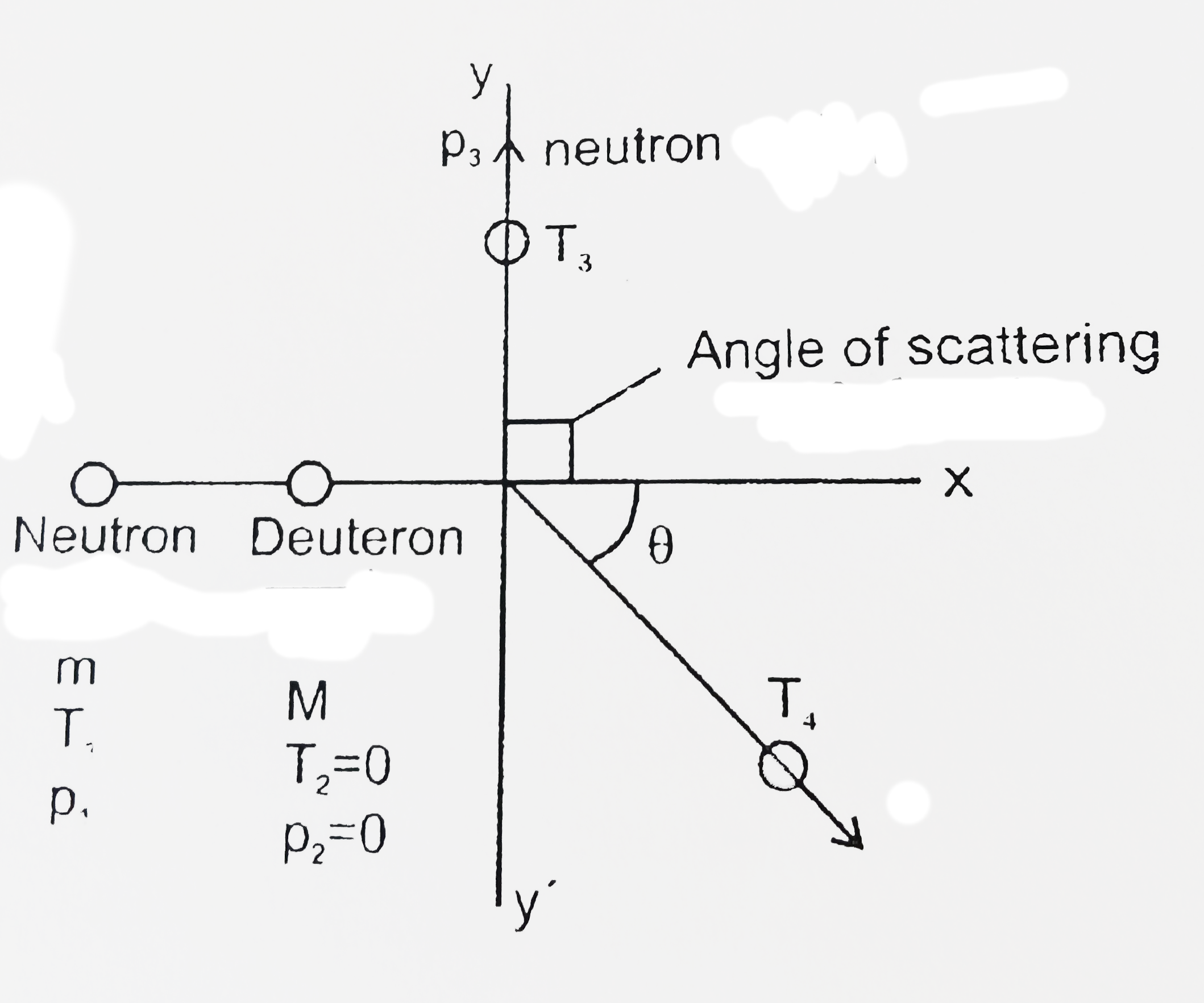A neutron collides elastically with an initially stationary deuteron. Find the fraction of the kinetic energy lost by the neutron (a) in a head-on collision , (b) in scattering at right angles.
The correct Answer is:(a) η=4mM/(m+M)2=0.89
(b)η=2m/(m+M)=2/3
Here m and M are the masses of a neutron and deutron.
According conservation principal of momentum,
→p1+→p2=→p3+→p4
or p1=p3+p4.....(4)
According conservation principle of kinetic energy
T1+T2=T3+T4orT1=T3+T4
or p212m=p232m+p242m
or p212m=(p1−p4)22m+p242m (from eqn.(i))
or p212m=p21+p24−2p1p42m+p242morp212m=p212m+p242m+p242m
or p4(1m+1M)=2p1p42morp4(1m+1M)=2p1m
or p4=(2Mm+M)p1
∴p24=(2Mm+M)2p21.....(ii)
∴ Loss in kinetic energy of neuton =ΔT1= gain in K.E. of deuteron
ΔT1=T4=p242M
Fraction =ΔT1T1=(2Mm+M)2p212Mp212m
η=(2Mm+M)(mM)=4mM(m+M)2
Here M≈2m
∴ Fraction in η=89=0.89
(b) According to conservation priciple of momentum,
→p1+→p2=→p3+→p4
or →p1+0=→p3+→p4
or →p1−→p23−2p1p3+→p4
Applying parallelogram law of vectors
p21+p23−2p1p3cos90∘=p24
According to conservation principle of kinetic energy
T1+T2=T3+T4
or T1+0=T3+T4
or p212m=p232m+p242m
or p212m=p232m+p21+p232M
or p212m=p232m+p21+p232M
or p212m=p232m+p21+p232M
or p212m(1m−1M)=p231(1m−1M)
or p21p212m(M−mmN)=+p23(m+MmM)
or p23=(m−Mm+M)p21
∴ Loss in kinetic energy of neutron is
ΔT=T1−T3
=p212m−p232m=p21−p232m
η=ΔTT1=p21−p232mp212m
1−p23p21=1−(M−mM+m)p21p21
h=1−(M=mM+m)=2mM+m=23

Topper's Solved these Questions
Similar Questions
A neutron collides elastically with an initially stationary deuteron. Find the fraction of the kinetic energy lost by the neutron
(a)in a head-on collision
(b) in scatterting at right angles.
View SolutionA neutron collides elastically with an initially stationary deuteron. Find the fraction of the kinetic energy lost by the neutron in a head-on collision?
View Solution
Knowledge Check
A moving neutron collides with a stationary α - particle . The fraction of the kinetic energy lost by the neutron is
A1625B925C35D25A neutron makes is a head - on elastic collision with a stationary deuteron The fraction energy loss of the neutron in the collision is
A16/81B8/9C8/27D2/3A neutron collides head-on and elasticity with an atom of mass number A, which is initially at rest. The fraction of kinetic energy retained by neutron is
A(AA+1)2B(A−1A+1)2C(A−1A)2D(A+1A−1)2
A neutron makes a head-on elastic collision with a stationary deuteron. The fraction energy loss of the neutron in the collision is
View SolutionA neutron makes a head-on elastic collision with a stationary deuteron. The fraction energy loss of the neutron in the collision is
View SolutionA neutron collides head-on and elasticity with an atom of mass number A, which is initially at rest. The fraction of kinetic energy retained by neutron is
View SolutionA neutron collides, head-on with a deuterium at rest. What fraction of the neutron's energy would be transferred to the deuterium?
View SolutionA neutron collides, head-on with a deuterium at rest. What fraction of the neutron's energy would be transferred to the deuterium?
View Solution
